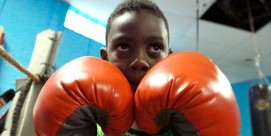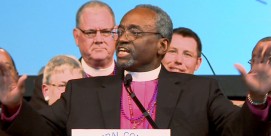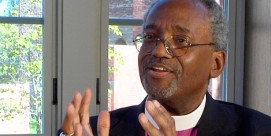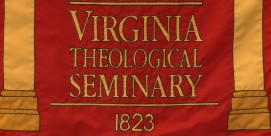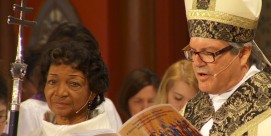In This Episode << SLIDE LEFT TO SEE ADDITIONAL SEGMENTS
A New Archbishop for the See of Canterbury
Read additional comments on the appointment of Rowan Williams as the 104th Archbishop of Canterbury:
Rowan Williams is perhaps the most significant theologian of his generation. But what makes him so very remarkable is that this extraordinary intellect is rounded with a deep pastoral sensitivity, and with all the passion and emotional depth of a great poet. His appointment as Archbishop of Canterbury is a great triumph for the worldwide Church, and a cause for celebration throughout the Anglican Communion.
Rowan was my teacher at Cambridge in the early 1980s. A great many of us who went through Oxford and Cambridge in those years were inspired to become Christian theologians by his profound theological insight and his thorough and patient teaching. We have continued to look to him for inspiration and guidance — not only with respect to the content of our own writing and teaching, but as a model of how the intellectual, pastoral, spiritual, and poetic elements of theology are appropriately fused in the service of the Church. He combines a thoroughgoing orthodoxy with a wholehearted commitment to the greater inclusion, into the life and ministry of the Church, of those it has marginalized: women, gay and lesbian people, and those who have suffered under European colonization. He defies the easy dichotomies of liberal or conservative, or high or low church. He combines an evangelical zeal and a commitment to the Bible with a sensitivity to the ongoing development of doctrine and an intense love of the Church catholic. He will not “split” the Anglican Communion, as some have feared, but will be a key figure in its ongoing processes of reconciliation and healing.
Rowan Williams’s emotional and spiritual life is shaped by great literature (particularly Shakespeare, Dostoevsky, T. S. Eliot, Dylan Thomas, and Iris Murdoch), as well as by great theologians (particularly Augustine, the Cappadocian fathers, Thomas Aquinas, and Teresa of Avila). He therefore knows what it means for the Church to become a narrative and imaginative world that people will love to inhabit. He is a dramatic and challenging preacher, an active commentator on current events, and a published poet.
This unique fusion of the spiritual, intellectual, pastoral, and imaginative elements of the Christian faith has produced some of the most important theological figures of the modern era: Karl Barth, Hans Urs von Balthasar, Sergei Bulgakov, and Dietrich Bonhoeffer. Rowan Williams is the most serious entry into this field that the Anglican world has produced in at least a century, and perhaps ever. He will be an Archbishop of Canterbury in the likeness of William Temple or Michael Ramsey, and yet exceeding them in his command of the theological depths and his willingness to reach out to the worldwide Anglican Communion.
— David S. Cunningham, professor of theology and ethics, Seabury-Western Theological Seminary, Evanston, Illinois
On September 11, Rowan Williams was preparing to give an address at Trinity Church, Wall Street, when the World Trade Center towers were attacked. Characteristically, he went into the streets of Lower Manhattan to help. He is a man who can talk brilliantly about what it means to be Christian but who does not hesitate to go into the street to be a Christian when the sky is falling.
Williams is as complex as the Anglican Communion he has been called to serve. Creatively orthodox in his beliefs and thoughtfully progressive in his social vision, he is perhaps uniquely qualified to speak to both the liberal and conservative wings of the Church. The unity of our diverse worldwide communion is the greatest challenge he faces, as he has said himself. He understands that the problems we face in the Church and the world cannot be solved by religious pronouncement or pious sentiment. There is hard work to be done on issues as diverse as AIDS in Africa, the plight of Palestinian Christians, and irregular ordinations of bishops. We can expect Williams to be in the places where the compassion of Christ is needed.
To understand others, as he writes in his book about September 11, we have to feel the concreteness of their suffering. “You have to be patient with the meanings that the other is struggling to find or form for themselves. Acknowledging the experience you share is the only thing that opens up the possibility of finding a meaning that can be shared, a language to speak together.” This generosity of spirit is what Williams brings to the See of Canterbury and to a world in pain.
— Bishops M. Thomas Shaw, S.S.J.E, Barbara C. Harris, and Bud Cederholm, Episcopal Diocese of Massachusetts
I am thrilled at the news of the appointment of Rowan Williams as Archbishop of Canterbury. About thirty years ago, Rowan stayed with us in our home at the General Theological Seminary while he was working on his doctorate, and we have met from time to time over the intervening years. He left with us as a gift a little multicolored Indian bird that I see everyday — a small but fitting emblem of his open and loving intelligence and unfussy spirituality. University of Cambridge divinity professor Nicholas Lash put it well when he commented that Rowan is rigorously orthodox. The trouble is that most people do not have a clue about what that might mean. They now have a chance to find out!
This appointment should be a challenge to both progressives and conservatives. The Archbishop-elect will not fit easily into any theological category. His theology is profound and accessible, and I have been personally helped through periods of discouragement about the Church by his writings. This is cheering news, and he deserves our love, support and prayers.
–The Very Rev. Alan Jones, Dean of Grace Cathedral in San Francisco
The elevation of Rowan Williams to the Canterbury primacy seems little short of a providential miracle. Normally today, especially in contemporary Britain, you have to be mediocre to reach the top, but Rowan has done it despite being brilliant, charismatic, and uncompromising.
It is extraordinary, even in a country where the “moral right” (unlike the U.S.) fortunately no longer exists, that someone who admits to having ordained practicing gays in faithful relationships — against the regulations of the Church Synod — should nonetheless have reached occupancy of the prime Anglican see. It is equally extraordinary that someone who in American terms is on the far left politically should have done so. How has this come about?
Partly it is because Rowan is indeed a one in a million, once in a generation kind of person whom you can’t step over without feeling a certain sense of shame. Manifestly he is a holy and wise man — as with John Paul II and maybe even more so. But it is also because, like all who are truly as innocent as doves, Rowan is also as wise as a serpent. He rarely puts a foot wrong politically and has a knack of saying the right things at the right time. He can sound more moderate than he really is, and at the same time even his more “extreme” views (it is now extreme to be an orthodox Christian and extreme to be a socialist) are always held with a great deal of nuance, tolerance, realism, and skeptical sense that no human idea is worth all that much in the end. If he is tremendously hopeful, then he is also massively attuned to the tragedy and pathos of the fallen human condition. American conservatives who imagine that all lefties fail to have a doctrine of original sin are going to be horribly confused.
Too many expectations may be invested in Rowan because of his brilliance. Nonetheless I think that by just carrying on his usual mode of operation — touring, writing, media appearances — he will make things happen. First of all, he will become an ecumenical focus. European Catholics are looking for an alternative to flaccid liberalism on the one hand and authoritarian papalism on the other; American Protestants are increasingly Catholic in their theology and open to the Anglo-Catholic legacy that Rowan represents. Unlike most Anglicans, he knows why he is one: he is the heir to Thomas Hooker and Lancelot Andrewes (to seventeenth-century, not original Anglicanism, I would say) in believing that the Reformation must itself be reformed because it did not achieve exactly the right reformed Catholic vision that was required. Of course, Rowan’s resonance with Eastern Orthodoxy is obvious and explicit.
Secondly I think that Rowan will encourage a wide intellectual debate, aided by many others, which will much more open up the Church itself and Church practice to considerations that have arisen in the wake of “postmodernism” and “postliberalism.” Often these fail to reach the media level, which for some reason wallows in a totally discredited one-dimensional scientism and dogmatic Darwinism (especially in the U.K.). Rowan’s presence, I think, will cause this to change — the British press is already fascinated: “An intellectual Christian!” People are starting to realize that maybe Orthodox Christianity has unique resources for resistance to the hegemony of capitalism, bureaucracy and technology. Quickly the British press recognized that Rowan was no simple “liberal,” but at once Orthodox and Radical.
Thirdly, I think Rowan will see no point in “managing decline.” He will instead know that even a seemingly doomed Church can only go on proclaiming the folly of the gospel, since that is its raison d’etre. Strange tensions could emerge between a declining Church with an increased public presence. In the face of this, Rowan may encourage us to stop thinking simply in terms of “going to church,” but instead in terms of liturgical acts that subversively invade the public space — from obvious things like processions and throwing open church doors to public usage, to less obvious things like challenging the secular dominance of space and time by attempts to introduce more sacramental rhythms.
Expect the extraordinary — even that one man (“with a little help from his friends,” a la the Beatles) may stop or delay an avalanche.
— John Milbank, professor of theology at the University of Virginia and editor, with Catherine Pickstock and Graham Ward, of RADICAL ORTHODOXY: A NEW THEOLOGY.

